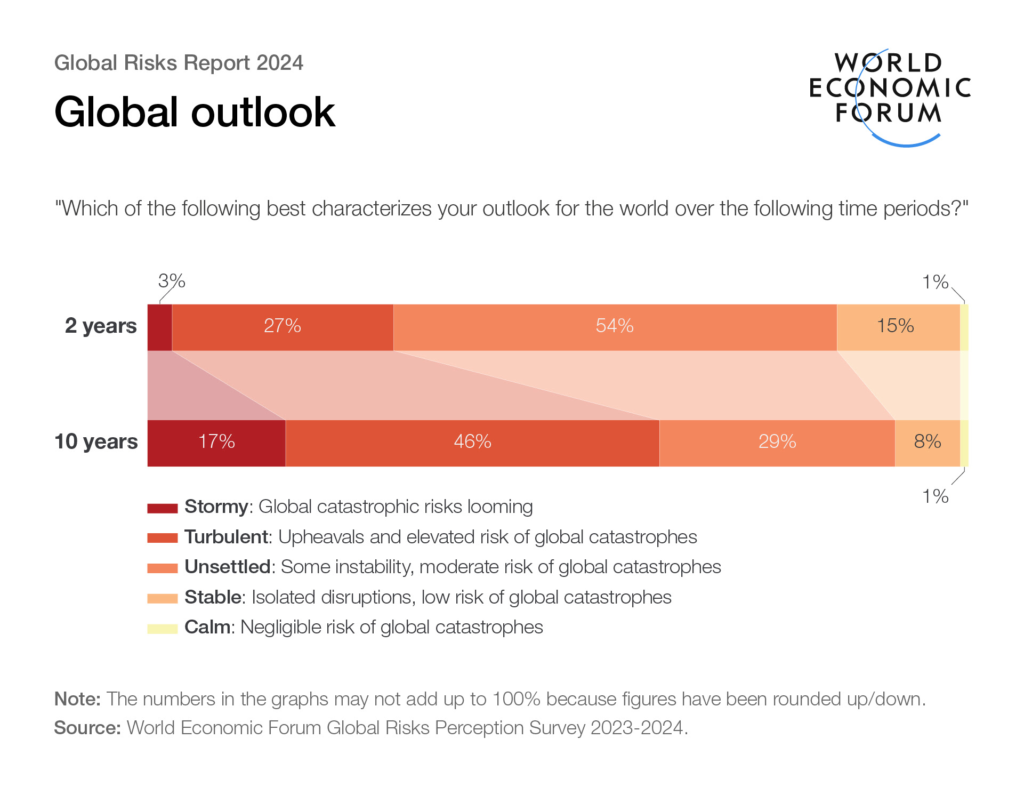Geneva, Switzerland, 10 January 2024 – The World Economic Forum’s Global Risks Report 2024, released today, has identified disinformation and misinformation as the most significant short-term global risks. This revelation comes against a backdrop of escalating environmental threats and challenges in the realms of technology, geopolitics, and demographics.
The report draws upon the insights of over 1,400 global risk experts, policymakers, and industry leaders surveyed in September 2023. The results indicate a predominantly negative outlook for the world in both the short and long term. While 30% of experts anticipate a heightened likelihood of global catastrophes in the next two years, nearly two-thirds foresee this trend continuing over the next decade.
Saadia Zahidi, Managing Director of the World Economic Forum, remarked on the findings, stating, “An unstable global order characterized by polarizing narratives and insecurity, the worsening impacts of extreme weather and economic uncertainty are causing accelerating risks – including misinformation and disinformation – to propagate. World leaders must come together to address short-term crises as well as lay the groundwork for a more resilient, sustainable, inclusive future.”
Disinformation has risen to the forefront due to concerns over a persistent cost-of-living crisis and the intertwined risks of AI-driven misinformation and societal polarization. This issue is particularly relevant with elections scheduled in several major economies in the coming years. Additionally, interstate armed conflict is identified as a top-five concern in the short term, given underlying geopolitical tensions and societal resilience erosion.
The report also emphasizes the ongoing economic uncertainty and growing economic and technological divides that will mark the years to come. Lack of economic opportunity ranks sixth among concerns in the short term, while the longer-term outlook suggests barriers to economic mobility could increase, isolating conflict-prone or climate-vulnerable countries from investment and job creation opportunities.
Environmental risks remain at the forefront, dominating the global risk landscape across all timeframes. Two-thirds of global experts expressed concerns about extreme weather events in 2024. Issues like extreme weather, critical changes to Earth systems, biodiversity loss, ecosystem collapse, natural resource shortages, and pollution make up five of the top ten most severe perceived risks over the next decade. However, respondents disagreed on the urgency of these environmental risks, with the private sector expressing a belief that many will materialize over a longer timeframe.
The report calls on leaders to rethink their approach to addressing global risks and focus on rapidly building guardrails for emerging disruptive risks, such as AI in conflict decision-making. It also suggests actions that do not depend exclusively on cross-border cooperation, such as promoting digital literacy campaigns on misinformation and disinformation or investing in research and development for climate modeling and energy transition technologies.
Carolina Klint, Chief Commercial Officer, Europe, Marsh McLennan, stated, “Artificial intelligence breakthroughs will radically disrupt the risk outlook for organizations, with many struggling to react to threats arising from misinformation, disintermediation, and strategic miscalculation.”
John Scott, Head of Sustainability Risk, Zurich Insurance Group, added, “Ninety-one percent of risk experts surveyed express pessimism over the 10-year horizon. Known risks are intensifying, and new risks are emerging – but they also provide opportunities. Collective and coordinated cross-border actions play their part, but localized strategies are critical for reducing the impact of global risks.”
The Global Risks Report 2024 underscores the pressing need for global cooperation and new approaches to address these complex and interconnected global risks.

